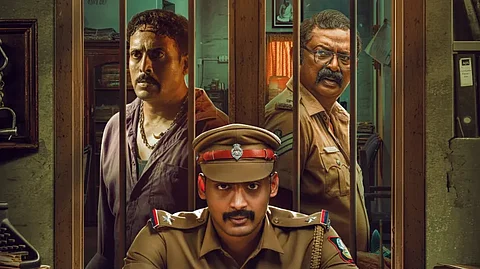

Debutant director Gowthaman Ganapathy's "Surrender" weaves together two parallel stories, leading up to assembly elections, but struggles to maintain focus as it progresses.
The plot kicks off when actor Mansoor Ali Khan surrenders his gun at Thirumazhisai police station in Tiruvallur district. Constable Periyasamy (Lal) takes charge of it, but the weapon mysteriously disappears. Meanwhile, Kanagu (Sujith), who runs an ice factory, handles voter bribery operations but loses Rs. 10 crore in an accident. With four days left until elections, Periyasamy and trainee police Pugazhendhi (Darshan) desperately search for the missing gun while Kanagu and his team hunt for the lost money. The events that unfold during this frantic search form the core of "Surrender."
Darshan delivers only half of what's needed in action, emotion, and intensity. Lal takes control of the film's emotional center, using his experience to show uncontrolled anger and desperate moments convincingly. Sujith earns the right amount of hatred as an arrogant villain, standing out with his subtle expressions and body language that go beyond typical villain roles. The supporting cast does their part well. Kaushik plays the villain's brother, Arul and Ramya Ramakrishnan appear as police officers, Sundareswaran as a rowdy, Semmalar Annam as a poor girl, and Munishkanth handles comedy duties.
Cinematographer Meyyendiran captures the night scenes effectively, making the suspenseful moments more noticeable. Editor Renu Gopal handles the action and fight scenes with sharp cuts in the first half but loses control in the second half. Vikas Badisa's background score provides the right support for action, thriller, and emotional scenes. Art director R.K. Manoj Kumar's efforts are clearly visible in the Police Station setup.
The screenplay unfolds in layers, giving proper depth to trainee cop Pugazhendhi, Periyasamy, their police station dynamics, internal politics, Kanagu's criminal background, and his operations. After the gun and money disappear, the script maintains excitement until intermission. The points where both stories meet and characters from different plots clash create the first half's backbone. Power struggles within the police station and the relationships between police, politicians, and rowdies add strength to the main story.
However, Munishkanth's comedy track fails to bring laughs and only slows things down. After intermission, the screenplay loses its way and gets distracted by different issues. At one point, it goes so far off track which makes us forget the main conflict. While some scenes create tension, the script drags on with sudden emotional moments and unnecessary action sequences. Munishkanth's story also overstays its welcome, further slowing the pace.
Finally, just before the climax, the screenplay makes a quick return to the central story, but abandons logic, and rushes to the ending with typical heroic scenes. The actors' performances help the emotional final scenes work, but the damage is already done.
Since the second half fails to maintain the focus, audiences can't fully surrender to what happens on screen. "Surrender" starts as a promising crime thriller but loses its grip when it matters most.